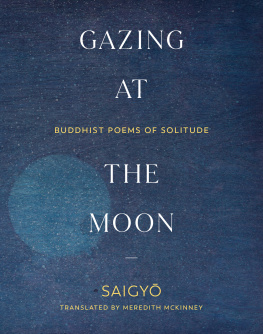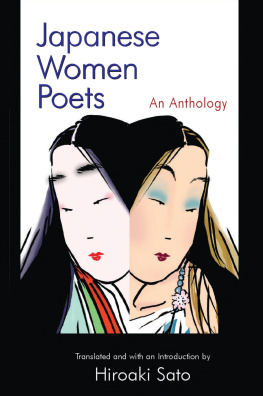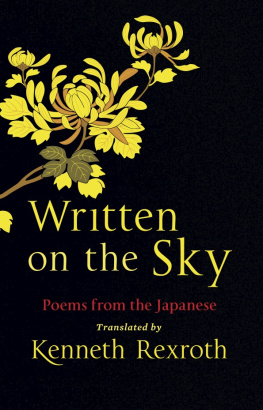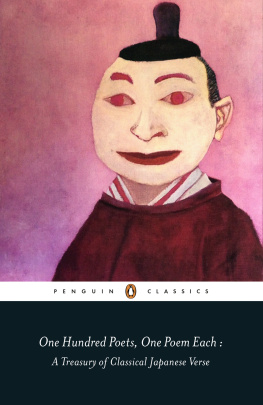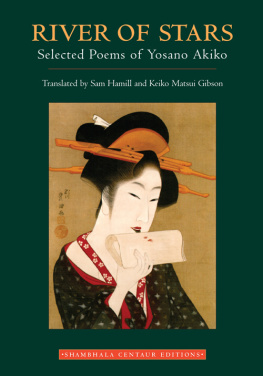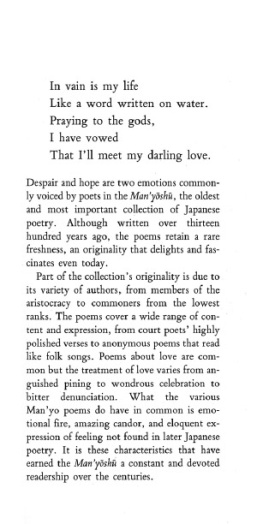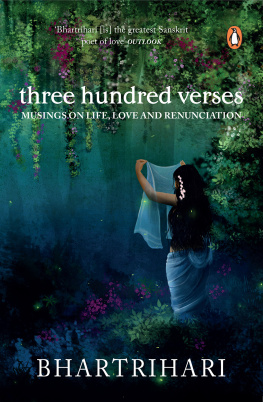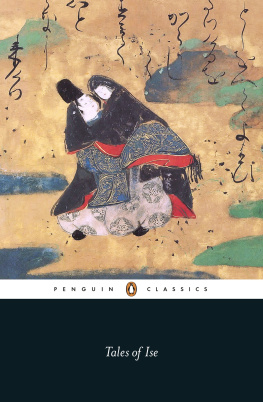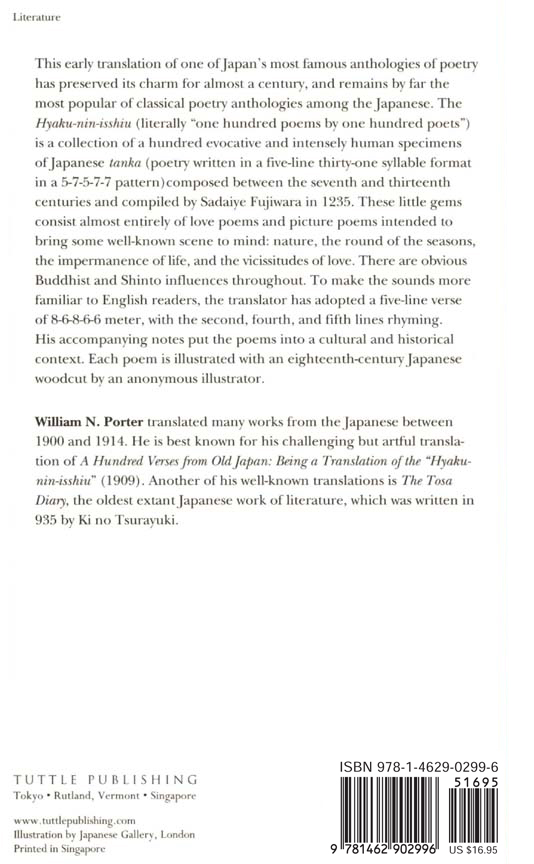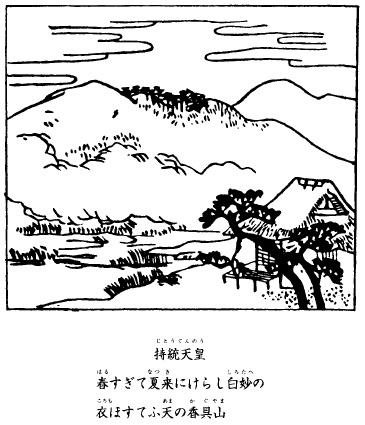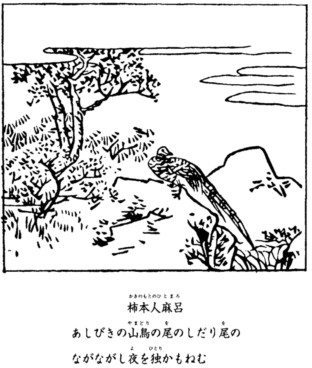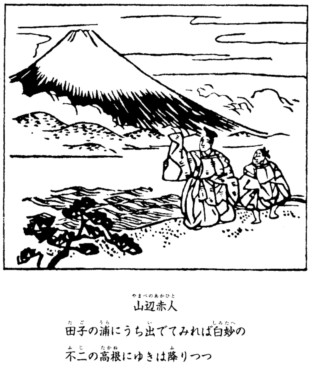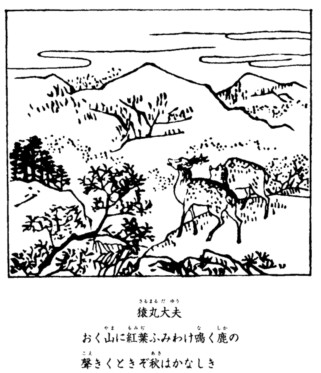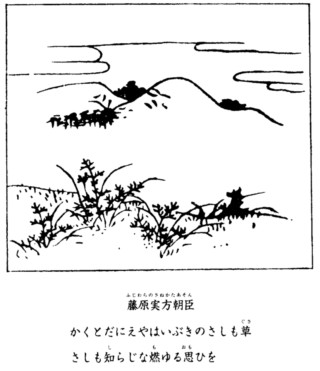TENJI TENN
Aki no ta no Kari ho no iho no Toma wo arami Waga koromode wa Tsuyu ni nure-tsutsu. 668 to 671, his capital was Otsu, not far from Kyoto, and he is chiefly remembered for his kindness and benevolence. 668 to 671, his capital was Otsu, not far from Kyoto, and he is chiefly remembered for his kindness and benevolence.
It is related, that one day he was scaring birds away, while the harvesters were gathering in the crop, and, when a shower of rain came on, he took shelter in a neighboring hut; it was, however, thatched only with coarse rushes, which did not afford him much protection, and this is the incident on which the verse is founded. The picture shows the harvesters hard at work in the field, and the hut where the Emperor took shelter.
JIT TENN
Haru sugite Natsu ki ni kerashi Shirotae no Koromo hosu teu Ama-no-kagu yama
THE EMPRESS JIT
THE spring has gone, the summer's come, And I can just descry The peak of Ama-no-kagu, Where angels of the sky Spread their white robes to dry.
The Empress Jit reigned A.D. 690-696, during which time sak was first made and drunk in Japan; she was the daughter of the Emperor Tenji, the writer of the previous verse, and she married the Emperor Temmu, ascending the throne herself on his death. The poem refers to a snow-capped mountain just visible on the horizon. One of the N dramas relates, that an angel once came to a pine forest on the coast near Okitsu, and, hanging her feather mantle on a pine tree, climbed a neighboring mountain to view Mount Fuji; a fisherman, however, found the robe and was about to carry it off with him, when the angel reappeared and begged him to give it her, as without it she could not return to the moon where she lived.
He only consented to do so, however, on condition that she would dance for him; and this she accordingly did, draped in her feathery robe on the sandy beach under the shade of the pine trees; after which she floated heavenward, and was lost to view. KAKI-NO-MOTO NO HITOMARO
Ashibiki no Yamadori no o no Shidario no Naga-nagashi yo wo Hitori ka mo nemu.
THE NOBLEMAN KAKI-NO-MOTO
LONG is the mountain pheasant's tail That curves down in its flight; But longer still, it seems to me, Left in my lonely plight, Is this unending night.
The writer was a foundling, picked up and adopted by Abaye at the foot of a persimmon tree, which is in Japanese
kaki, from which he got his name. He was an attendant on the Emperor Mommu, who reignedA.D. 697-707, and was one of the great poets of the early days of Japan; he is known as the rival of Akahito Yamabe (see next verse), and after death was deified as a God of Poetry. There is a temple erected in his honor at Ichi-no-Moto, and another at Akashi, not far from Kobe; he died in the year 737.
In the fourth line nagashi may be taken as the adjective 'long', or the verb 'to drift along'; and yo may mean either 'night' or 'life'; so that this line, which I have taken as 'long, long is the night', may also mean 'my life is drifting, drifting along'. Yamadori (pheasant) is literally 'mountain bird', and ashibiki is a pillow-word for mountain, which is itself the first half of the word for pheasant.
YAMABE NO AKAHITO
Tago no ura ni Uchi-idete mireba Shirotae no Fuji no takane ni Yuki wa furi-tsutsu.
AKAHITO YAMABE
I STARTED off along the shore, The sea shore at Tago, And saw the white and glist'ning peak Of Fuji all aglow Through falling flakes of snow.
Akahito Yamabe lived aboutA.D. 700, and was one of the greatest of the early poets; he was contemporary with Kaki-no-Moto, the writer of the previous verse, and like him was deified as a God of Poetry.
SARU MARU DAY
Oku yama ni Momiji fumi wake Naku shika no Koe kiku toki zo Aki wa kanashiki.
SARU MARU, A SHINTO OFFICIAL
I HEAR the stag's pathetic call Far up the mountain side, While tramping o'er the maple leaves Wind-scattered far and wide This sad, sad autumn tide.
Very little is known of this writer, but he probably lived not later than A.D. 800. 800.
Stags and the crimson leaves of the maple are frequently used symbolically of autumn.
YOSHITAKA FUJIWARA
DEATH had no terrors, Life no joys, Before I met with thee; But now I fear, however long My life may chance to be, 'Twill be too short for me!
Yoshitaka died in the year 974. See verse No. 18 for a note of the Fujiwara family.
FUJIWARA NO SANEKATA ASON
Kaku to dani Eyawa Ibuki no Sashi-mogusa Sashimo shiraji na Moyuru omoi wo.
THE MINISTER SANEKATA FUJIWARA
THOUGH love, like blisters made from leaves Grown on Mount Ibuki, Torments me more than I can say, My lady shall not see, How she is paining me.
The writer lived some time at the close of the tenth century.
The artemisia plant (or mugwort) is used in Japan for cauterizing; a conical wad of the leaves or blossoms is placed on the spot, lit at the top, and allowed to burn down to the skin; this produces a blister, and is extremely painful. Ibuki is a hill, between the Provinces of Omi and Mino, famous for its artemisia, but ibuki can also stand for iu beki, which, in conjunction with e ya wa, would mean, 'Ah! how could I tell her!' But eyawa as one word means 'indescribable!' Notice also sashimo in the third and fourth lines; sashi-mogusa means 'the artemisia plant', but sashi mo means 'even though it is smarting'; sashimo, in one word, can also mean 'in such a way'. This verse is a very good example of the way the Japanese love to play upon words. The picture seems to show Mount Ibuki with the mugwort growing on it.
FUJIWARA NO MICHINOBU ASON








